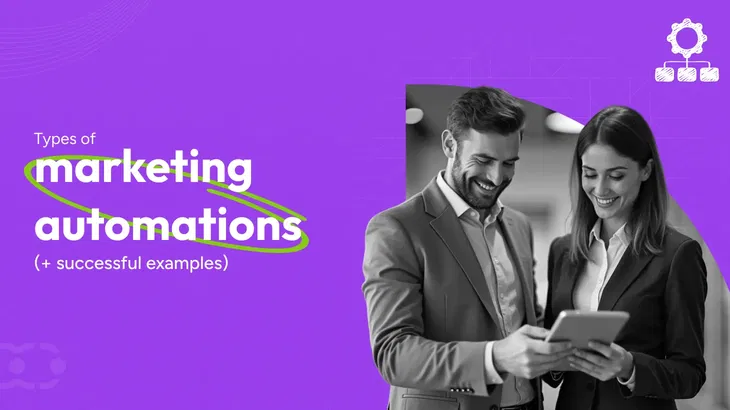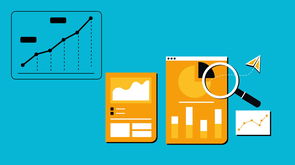Key takeaways
- Marketing automation helps streamline repetitive tasks, freeing up time for more strategic activities and improving sales efforts.
- It improves sales processes by automating deal management, follow-ups, and nurturing efforts, making it easier for sales teams to manage leads and engage target audiences effectively.
- Automation allows businesses to scale digital marketing efforts, maintain personalized customer engagement, and track data to reach target audiences more efficiently.
- It enhances customer retention through automated loyalty programs and re-engagement campaigns, ensuring businesses stay connected with their audience effectively.
- Real-time insights provided by automation tools help refine strategies, optimize sales efforts, and improve marketing outreach to target audiences for better results.
Imagine having a marketing engine that works 24/7, effortlessly engaging customers, nurturing leads, and driving revenue—all while you focus on strategy.
That’s the magic of marketing automation.
Whether you’re looking to streamline repetitive tasks, deliver personalized customer journeys, or optimize your sales funnel, the right automation platforms can transform your business.
But with so many types of marketing automation software out there, how do you choose the right ones?
This blog covers 19 essential marketing automations that will not only enhance customer engagement but also help you recover lost sales, improve lead management, and fuel long-term growth.
Ready to turn your marketing efforts into a well-oiled, revenue-generating machine?
Let’s dive in!
Why use marketing automation?
Implementing a successful marketing automation strategy allows businesses to streamline marketing tasks, nurture leads, and improve customer engagement without requiring constant manual intervention.
Here’s why businesses are turning to marketing automation software:
- Enhance customer experiences: By delivering personalized customer journeys, businesses can ensure that every interaction is relevant and engaging. Whether through email marketing, push notifications, or social media marketing, automation ensures that the right message reaches the right customer at the right time.
- Increase efficiency and productivity: Marketing and sales teams no longer have to waste time on repetitive marketing tasks. With automation, they can focus on strategy and high-value activities, improving overall performance.
- Improve lead management: Automation enables efficient lead management, including lead scoring, follow-ups, and segmentation. This helps businesses nurture and convert leads more effectively.
- Boost sales and revenue: A well-implemented marketing automation strategy ensures that businesses recover lost sales, encourage repeat purchases, and build brand loyalty by keeping existing customers engaged.
- Leverage valuable insights: Businesses can track campaign performance, analyze customer data, and gain insights into customer behavior, enabling marketers to refine their marketing strategies for better results.
When do you need marketing automation?
While marketing automation platforms offer tremendous benefits, not every business may require automation from day one.
Here are some key signs that indicate it's time to invest in a marketing automation tool:
1. You’re struggling with repetitive tasks
If your team is bogged down by routine tasks like email marketing, managing social media posts, or handling customer inquiries, it’s a sign you need automation.
These tools can streamline such activities, freeing up valuable time for more strategic work and allowing your team to focus on high-value tasks.
2. Your sales team is overwhelmed
When your sales team finds it hard to manage a growing number of leads, follow-ups, and conversions, marketing automation can help.
It streamlines the sales process by automating follow-ups and nurturing efforts, ensuring that leads are tracked and engaged without manual intervention.
3. You have a large customer base
As your customer base grows, manually handling interactions across multiple channels becomes less efficient.
Marketing automation helps scale your efforts, enabling personalized communication and consistent customer engagement at scale while saving time and resources.
4. Your marketing campaigns lack personalization
If your marketing campaigns aren't effectively tailored to individual customer behaviors or preferences, you’re missing out on higher conversion rates.
By leveraging marketing automation, you can deliver personalized messaging based on customer data, improving engagement by delivering the right content through the right channels at the right time.
5. You need better customer retention
Retaining existing customers is often more cost-effective than acquiring new ones.
Marketing automation facilitates loyalty programs and automated re-engagement campaigns that nurture relationships with existing customers, increasing their lifetime value and fostering long-term loyalty.
6. You're not tracking customer data effectively
Without the right data analytics tools, it’s difficult to gauge the success of your campaigns or understand customer behaviors.
Marketing automation tools offer real-time insights, helping you track campaign performance, refine strategies, and make data-driven decisions to optimize marketing efforts.
Types of marketing automation
Marketing automation is a game-changer for businesses looking to streamline marketing tasks, enhance customer engagement, and optimize the sales process.
With various automation platforms available, businesses can tailor their marketing automation strategy to improve lead generation, nurture relationships, and increase revenue.
Below are the key types of marketing automation that help sales and marketing teams drive efficient lead management and maximize results.
1. CRM automation
A customer relationship management (CRM) system integrated with marketing automation software helps track customer interactions, manage customer data, and streamline communication.
Businesses can automate tasks such as lead follow-ups, segmentation, and personalized messaging to nurture leads and increase customer experiences.
CRM automation plays a critical role in sales funnel optimization, ensuring that sales teams engage with the right prospects at the right time.
Example
Imagine an eCommerce company using customer relationship management (CRM) automation to track customer behavior and automatically trigger follow-up emails based on their browsing history.
If a customer views a product multiple times but doesn’t purchase, the system sends an automated message with a special discount, increasing customer retention and recovering lost sales.
2. Social media marketing automation
Managing multiple social media platforms manually is time-consuming. Social media automation platforms allow businesses to schedule posts, track engagement, and analyze campaign performance.
These automation tools help businesses deliver relevant content, maintain brand consistency, and interact with their audience across different marketing channels without spending hours on manual posting.
Example
A fashion brand uses social media automation to schedule product launch announcements on Instagram, Facebook, and Twitter. It also sets up automated responses to common queries via chatbots, improving customer engagement.
3. Advertising automation
Paid advertising campaigns, such as Google Ads and social media ads, can be optimized through automation platforms.
Marketing automation tools help in budget allocation, campaign performance tracking, and targeting specific audiences based on customer behavior and preferences.
Businesses can also use retargeting campaigns to bring back visitors who showed interest but didn’t convert, helping recover lost sales.
Example
An online electronics store sets up retargeting campaigns that automatically display product ads to users who visited the website but didn’t complete a purchase. This encourages repeat business and recovers lost sales.
4. Mobile marketing automation
With more customers using mobile devices, mobile marketing automation is essential. Businesses can send push notifications, SMS marketing messages, and in-app messages based on user behavior.
These automated SMS keep customers engaged through their preferred communication channels, ensuring higher customer retention and repeat business.
Example
A food delivery app sends personalized messages with special discount codes when users haven’t ordered in a while, encouraging repeat purchases.
5. Marketing analytics automation
Understanding campaign performance is crucial for refining marketing strategies. Marketing automation platform with analytics capabilities collects and interprets customer data, allowing marketers to make data-driven decisions.
This automation helps businesses track customer interactions, monitor lead management efforts, and optimize the sales funnel for better conversion rates.
Example
A SaaS company uses marketing automation software to track which blog posts generate the most leads, helping the team refine marketing strategies and produce more high-performing content.
6. Email marketing automation
There are various types of email marketing automation that enables businesses to automate repetitive tasks such as personalized customer journeys, email drip campaigns, and follow-up sequences.
Automated campaigns like cart abandonment emails, product recommendations, and re-engagement emails help businesses encourage prospects to complete purchases and stay engaged.
Want to automate your emails?
Salesmate helps you automate personalized email journeys, follow-ups, and re-engagement campaigns to increase customer retention and drive sales.
Example
An online course provider uses email marketing automation to send drip campaigns. A user who signs up for a free trial receives a sequence of emails introducing the platform, followed by an upsell email for the premium plan.
7. Lead management automation
Handling leads manually can be overwhelming for sales and marketing teams. Marketing automation platforms help automate lead tracking, scoring, and assignments, ensuring that high-potential leads receive immediate attention.
By analyzing user behavior, businesses can segment leads and send personalized messages based on where they are in the sales funnel.
Example
A B2B software company scores leads based on their website activity. If a lead downloads a whitepaper and attends a webinar, the system automatically assigns them to a sales team member for follow-up.
8. Omni-channel automation
Consumers interact with brands across multiple marketing channels, from emails to social media marketing to chatbots.
Omni-channel automation ensures a seamless and consistent customer journey by synchronizing interactions across these platforms.
This allows businesses to enhance customer engagement and improve customer relationships through a unified communication approach.
Example
A travel agency automates customer interactions by sending an email with vacation deals, followed by an SMS reminder, and a chatbot interaction on Facebook Messenger for further inquiries.
9. Landing page automation
Creating high-converting landing pages is essential for generating leads. Marketing automation tools offer templates, A/B testing, and personalization features to optimize landing pages.
Automated landing page management helps businesses collect valuable customer data and improve campaign performance with minimal manual effort.
Example
A fitness brand uses landing page automation to display personalized messages based on user location, showing relevant gym memberships and promotions.
10. Web form automation
Web forms are crucial for capturing lead information. Marketing automation platforms enable businesses to auto-fill forms, validate data, and trigger automated messages upon submission.
This improves data quality, speeds up lead management, and ensures a smooth customer journey from inquiry to conversion.
Example
A real estate website uses marketing automation tools to auto-fill returning visitors’ details, reducing friction and increasing conversions.
11. Blog automation
Consistency is key in content marketing. Blog automation tools help schedule, distribute, and promote blog posts across various marketing channels, ensuring regular audience engagement.
Automation ensures that content reaches the right audience at the right time, maximizing visibility and brand loyalty.
Example
A tech blog uses automation to publish articles at peak engagement hours and automatically share them on social media.
12. Content marketing automation
Content marketing efforts, such as newsletters, social media distribution, and blog promotion, can be automated using marketing software.
These tools help track campaign performance, measure engagement, and ensure that businesses consistently deliver relevant content to their target audiences.
Example
A digital marketing agency automates newsletter creation by pulling top-performing blog articles into an email campaign for subscribers.
13. Lead scoring automation
Lead scoring automation assigns values to leads based on their actions, such as email engagement, website visits, and form submissions.
This helps sales teams focus on high-intent leads, ensuring efficient lead management and better conversion rates.
Example
A car dealership assigns high scores to leads who request a test drive, triggering an automated campaign from the sales team to schedule an appointment.
14. Lead nurturing automation
Not all leads convert immediately. Lead nurturing automation ensures that businesses stay connected with potential customers through personalized messages, educational content, and targeted offers.
This automation helps encourage repeat purchases, build customer loyalty, and push leads down the sales funnel.
Example
A software company sends educational content and case studies to leads who attended a webinar but haven’t purchased yet.
15. Retargeting campaigns
Many visitors leave without making a purchase. Retargeting campaigns automatically display ads to these visitors across different platforms, reminding them to complete their transaction.
This automation helps businesses recover lost sales and improve conversion rates.
Example
An online clothing store runs retargeting ads showing the exact items a customer viewed but didn’t buy, increasing repeat business.
16. Upselling and cross-selling automation
Encouraging customers to buy complementary or higher-value products can significantly boost revenue.
Marketing automation software helps businesses recommend relevant products based on purchase history, enhancing customer experiences and maximizing sales.







Key takeaways
Imagine having a marketing engine that works 24/7, effortlessly engaging customers, nurturing leads, and driving revenue—all while you focus on strategy.
That’s the magic of marketing automation.
Whether you’re looking to streamline repetitive tasks, deliver personalized customer journeys, or optimize your sales funnel, the right automation platforms can transform your business.
But with so many types of marketing automation software out there, how do you choose the right ones?
This blog covers 19 essential marketing automations that will not only enhance customer engagement but also help you recover lost sales, improve lead management, and fuel long-term growth.
Ready to turn your marketing efforts into a well-oiled, revenue-generating machine?
Let’s dive in!
Why use marketing automation?
Implementing a successful marketing automation strategy allows businesses to streamline marketing tasks, nurture leads, and improve customer engagement without requiring constant manual intervention.
Here’s why businesses are turning to marketing automation software:
When do you need marketing automation?
While marketing automation platforms offer tremendous benefits, not every business may require automation from day one.
Here are some key signs that indicate it's time to invest in a marketing automation tool:
1. You’re struggling with repetitive tasks
If your team is bogged down by routine tasks like email marketing, managing social media posts, or handling customer inquiries, it’s a sign you need automation.
These tools can streamline such activities, freeing up valuable time for more strategic work and allowing your team to focus on high-value tasks.
2. Your sales team is overwhelmed
When your sales team finds it hard to manage a growing number of leads, follow-ups, and conversions, marketing automation can help.
It streamlines the sales process by automating follow-ups and nurturing efforts, ensuring that leads are tracked and engaged without manual intervention.
3. You have a large customer base
As your customer base grows, manually handling interactions across multiple channels becomes less efficient.
Marketing automation helps scale your efforts, enabling personalized communication and consistent customer engagement at scale while saving time and resources.
4. Your marketing campaigns lack personalization
If your marketing campaigns aren't effectively tailored to individual customer behaviors or preferences, you’re missing out on higher conversion rates.
By leveraging marketing automation, you can deliver personalized messaging based on customer data, improving engagement by delivering the right content through the right channels at the right time.
5. You need better customer retention
Retaining existing customers is often more cost-effective than acquiring new ones.
Marketing automation facilitates loyalty programs and automated re-engagement campaigns that nurture relationships with existing customers, increasing their lifetime value and fostering long-term loyalty.
6. You're not tracking customer data effectively
Without the right data analytics tools, it’s difficult to gauge the success of your campaigns or understand customer behaviors.
Marketing automation tools offer real-time insights, helping you track campaign performance, refine strategies, and make data-driven decisions to optimize marketing efforts.
Types of marketing automation
Marketing automation is a game-changer for businesses looking to streamline marketing tasks, enhance customer engagement, and optimize the sales process.
With various automation platforms available, businesses can tailor their marketing automation strategy to improve lead generation, nurture relationships, and increase revenue.
Below are the key types of marketing automation that help sales and marketing teams drive efficient lead management and maximize results.
1. CRM automation
A customer relationship management (CRM) system integrated with marketing automation software helps track customer interactions, manage customer data, and streamline communication.
Businesses can automate tasks such as lead follow-ups, segmentation, and personalized messaging to nurture leads and increase customer experiences.
CRM automation plays a critical role in sales funnel optimization, ensuring that sales teams engage with the right prospects at the right time.
Example
Imagine an eCommerce company using customer relationship management (CRM) automation to track customer behavior and automatically trigger follow-up emails based on their browsing history.
If a customer views a product multiple times but doesn’t purchase, the system sends an automated message with a special discount, increasing customer retention and recovering lost sales.
2. Social media marketing automation
Managing multiple social media platforms manually is time-consuming. Social media automation platforms allow businesses to schedule posts, track engagement, and analyze campaign performance.
These automation tools help businesses deliver relevant content, maintain brand consistency, and interact with their audience across different marketing channels without spending hours on manual posting.
Example
A fashion brand uses social media automation to schedule product launch announcements on Instagram, Facebook, and Twitter. It also sets up automated responses to common queries via chatbots, improving customer engagement.
3. Advertising automation
Paid advertising campaigns, such as Google Ads and social media ads, can be optimized through automation platforms.
Marketing automation tools help in budget allocation, campaign performance tracking, and targeting specific audiences based on customer behavior and preferences.
Businesses can also use retargeting campaigns to bring back visitors who showed interest but didn’t convert, helping recover lost sales.
Example
An online electronics store sets up retargeting campaigns that automatically display product ads to users who visited the website but didn’t complete a purchase. This encourages repeat business and recovers lost sales.
4. Mobile marketing automation
With more customers using mobile devices, mobile marketing automation is essential. Businesses can send push notifications, SMS marketing messages, and in-app messages based on user behavior.
These automated SMS keep customers engaged through their preferred communication channels, ensuring higher customer retention and repeat business.
Example
A food delivery app sends personalized messages with special discount codes when users haven’t ordered in a while, encouraging repeat purchases.
5. Marketing analytics automation
Understanding campaign performance is crucial for refining marketing strategies. Marketing automation platform with analytics capabilities collects and interprets customer data, allowing marketers to make data-driven decisions.
This automation helps businesses track customer interactions, monitor lead management efforts, and optimize the sales funnel for better conversion rates.
Example
A SaaS company uses marketing automation software to track which blog posts generate the most leads, helping the team refine marketing strategies and produce more high-performing content.
6. Email marketing automation
There are various types of email marketing automation that enables businesses to automate repetitive tasks such as personalized customer journeys, email drip campaigns, and follow-up sequences.
Automated campaigns like cart abandonment emails, product recommendations, and re-engagement emails help businesses encourage prospects to complete purchases and stay engaged.
Want to automate your emails?
Salesmate helps you automate personalized email journeys, follow-ups, and re-engagement campaigns to increase customer retention and drive sales.
Example
An online course provider uses email marketing automation to send drip campaigns. A user who signs up for a free trial receives a sequence of emails introducing the platform, followed by an upsell email for the premium plan.
7. Lead management automation
Handling leads manually can be overwhelming for sales and marketing teams. Marketing automation platforms help automate lead tracking, scoring, and assignments, ensuring that high-potential leads receive immediate attention.
By analyzing user behavior, businesses can segment leads and send personalized messages based on where they are in the sales funnel.
Example
A B2B software company scores leads based on their website activity. If a lead downloads a whitepaper and attends a webinar, the system automatically assigns them to a sales team member for follow-up.
8. Omni-channel automation
Consumers interact with brands across multiple marketing channels, from emails to social media marketing to chatbots.
Omni-channel automation ensures a seamless and consistent customer journey by synchronizing interactions across these platforms.
This allows businesses to enhance customer engagement and improve customer relationships through a unified communication approach.
Example
A travel agency automates customer interactions by sending an email with vacation deals, followed by an SMS reminder, and a chatbot interaction on Facebook Messenger for further inquiries.
9. Landing page automation
Creating high-converting landing pages is essential for generating leads. Marketing automation tools offer templates, A/B testing, and personalization features to optimize landing pages.
Automated landing page management helps businesses collect valuable customer data and improve campaign performance with minimal manual effort.
Example
A fitness brand uses landing page automation to display personalized messages based on user location, showing relevant gym memberships and promotions.
10. Web form automation
Web forms are crucial for capturing lead information. Marketing automation platforms enable businesses to auto-fill forms, validate data, and trigger automated messages upon submission.
This improves data quality, speeds up lead management, and ensures a smooth customer journey from inquiry to conversion.
Example
A real estate website uses marketing automation tools to auto-fill returning visitors’ details, reducing friction and increasing conversions.
11. Blog automation
Consistency is key in content marketing. Blog automation tools help schedule, distribute, and promote blog posts across various marketing channels, ensuring regular audience engagement.
Automation ensures that content reaches the right audience at the right time, maximizing visibility and brand loyalty.
Example
A tech blog uses automation to publish articles at peak engagement hours and automatically share them on social media.
12. Content marketing automation
Content marketing efforts, such as newsletters, social media distribution, and blog promotion, can be automated using marketing software.
These tools help track campaign performance, measure engagement, and ensure that businesses consistently deliver relevant content to their target audiences.
Example
A digital marketing agency automates newsletter creation by pulling top-performing blog articles into an email campaign for subscribers.
13. Lead scoring automation
Lead scoring automation assigns values to leads based on their actions, such as email engagement, website visits, and form submissions.
This helps sales teams focus on high-intent leads, ensuring efficient lead management and better conversion rates.
Example
A car dealership assigns high scores to leads who request a test drive, triggering an automated campaign from the sales team to schedule an appointment.
14. Lead nurturing automation
Not all leads convert immediately. Lead nurturing automation ensures that businesses stay connected with potential customers through personalized messages, educational content, and targeted offers.
This automation helps encourage repeat purchases, build customer loyalty, and push leads down the sales funnel.
Example
A software company sends educational content and case studies to leads who attended a webinar but haven’t purchased yet.
15. Retargeting campaigns
Many visitors leave without making a purchase. Retargeting campaigns automatically display ads to these visitors across different platforms, reminding them to complete their transaction.
This automation helps businesses recover lost sales and improve conversion rates.
Example
An online clothing store runs retargeting ads showing the exact items a customer viewed but didn’t buy, increasing repeat business.
16. Upselling and cross-selling automation
Encouraging customers to buy complementary or higher-value products can significantly boost revenue.
Marketing automation software helps businesses recommend relevant products based on purchase history, enhancing customer experiences and maximizing sales.
Example
Amazon automatically recommends related accessories (e.g., headphones for a new phone purchase) via automated messages.
17. Customer onboarding automation
A smooth onboarding process is essential for retaining new customers. Customer onboarding automation ensures that businesses send welcome emails, tutorials, and follow-up messages to new users.
This helps establish strong customer relationships and improves long-term engagement.
Example
A project management software sends an onboarding sequence with tutorials, checklists, and a direct link to book a call with a support specialist.
18. Loyalty program automation
Building customer loyalty requires consistency. Loyalty program automation allows businesses to track purchases, reward engagement, and send reminders about reward points.
Automated loyalty programs help encourage customers to make repeat purchases and improve brand loyalty.
Example
A coffee shop app sends automated reminders when a customer is close to earning a free drink.
19. Chatbot automation
AI-powered chatbot automation enables businesses to provide instant responses to customer inquiries.
Chatbots can handle FAQs, guide customers through the sales process, and assist in product recommendations, ensuring efficient lead management and improved customer interactions.
Example
A telecom company uses a chatbot on its website to answer billing inquiries and offer plan upgrades.
Looking for smarter customer support?
Salesmate’s AI-powered chatbots provide instant responses to inquiries, helping you streamline lead management and enhance customer interactions.
Final thoughts
By leveraging these types of marketing automation, businesses can significantly enhance their marketing efforts, optimize the sales process, and drive revenue growth.
Whether it’s email marketing automation, social media automation, or CRM automation, integrating these tools ensures better customer engagement, improved data analytics, and streamlined operations for sustained business success.
Frequently asked questions
1. What is marketing automation?
Marketing automation refers to the use of software to automate repetitive marketing tasks, such as email marketing, social media management, lead nurturing, and customer segmentation, allowing businesses to deliver personalized and efficient customer journeys.
2. Why should my business use marketing automation?
Marketing automation enhances customer experiences by delivering personalized interactions, increases efficiency by reducing manual tasks, improves lead management, boosts sales and revenue through targeted marketing campaigns, and provides valuable insights into customer behavior.
3. What is mobile marketing automation?
Mobile marketing automation enables businesses to send push notifications, SMS, and in-app messages based on user behavior, keeping customers engaged through their preferred communication channels and enhancing retention.
4. What are the types of marketing automations?
Marketing automation includes various tools designed to streamline tasks and enhance customer engagement. Key types include CRM automation, social media and advertising automation, email and lead management automation, and mobile, content, and chatbot automation. These tools improve efficiency, boost sales, and increase customer experience.
5. When is the right time to invest in marketing automation?
Consider marketing automation if you are struggling with repetitive tasks, if your sales team is overwhelmed, if you have a large customer base, if your campaigns lack personalization, or if you are not tracking customer data effectively.
Hinal Tanna
SEO SpecialistHinal Tanna is a SEO strategist and content marketer, currently working with the marketing team of Salesmate. She has a knack for curating content that follows SEO practices and helps businesses create an impactful brand presence. When she's not working, Hinal likes to spend her time exploring new places.